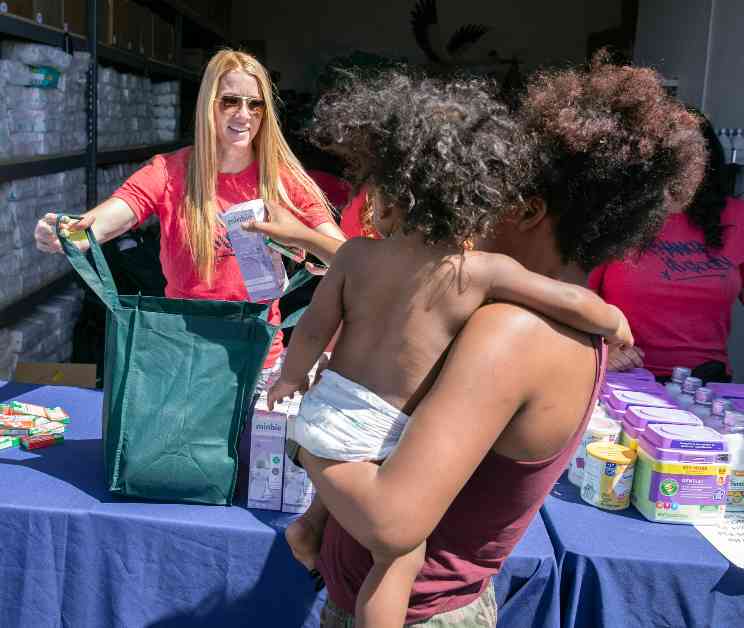Nevada voters will have the opportunity this November to vote on whether to exempt diapers from the state’s sales tax. If passed, Nevada could join 19 other states in exempting diapers from sales tax, a move that could potentially benefit families with young children and individuals requiring adult diapers.
What Question 5 Would Do
The ballot measure, known as Question 5, would amend the state’s 1955 Sales and Use Tax, which currently imposes a sales tax on revenue from personal property. The law already includes exemptions for various items like food, farm equipment, feminine hygiene products, and prosthetic devices. If Question 5 is approved, child and adult diapers would also be added to the list of exempted items.
The state sales tax rate in Nevada is currently 6.85 percent, although this rate can vary by county. The proposed exemption for diapers would take effect on January 1, 2025, and remain in place until the end of 2050. This means that for a period of 25 years, diapers would be exempt from sales tax in the state.
Legislative Background
The question to exempt diapers from sales tax was placed on the ballot by the Nevada Legislature through a bill introduced as SB428 in the 2023 legislative session. The bill passed both chambers of the Legislature unanimously and was subsequently signed by Republican Governor Joe Lombardo in June 2023, paving the way for its inclusion on the ballot.
Unlike proposed changes to the state constitution, which require approval in two consecutive legislative sessions before being put to a vote, the amendment to the sales tax law can proceed to the ballot after just one legislative session. This streamlined process allowed Question 5 to move forward quickly and be presented to voters in the upcoming election.
National Context
If Question 5 is approved by Nevada voters, the state will join a group of 19 states and the District of Columbia that have already exempted diapers from sales tax. This bipartisan trend spans across various states, from red states like North Dakota and Texas to blue states such as California and New York, indicating widespread recognition of the importance of making diapers more affordable for families.
The exemption of diapers from sales tax in other states has been met with positive feedback, with advocates arguing that it eases the financial burden on families with young children. By aligning with this national movement, Nevada has the opportunity to provide similar relief to its residents through Question 5.
Support for Question 5
Question 5 has garnered support from a variety of stakeholders, including local organizations and elected officials. Nonprofit organizations like Baby’s Bounty, which operates a diaper bank in Nevada, have expressed their backing for the exemption. Executive Director Kelly Maxwell highlighted the significant costs associated with diapering newborns, emphasizing that the sales tax exemption would help alleviate financial strain on families.
Progressive organization Battle Born Progress has also voiced its support for Question 5, recognizing the impact it could have on Nevada families. Elected officials like State Treasurer Zach Conine and Secretary of State Francisco Aguilar, both Democrats, have written letters in support of the measure, underscoring the importance of addressing the financial challenges faced by new parents in the state.
In his letter of support, Treasurer Conine emphasized the economic pressures experienced by Nevada families, particularly in light of market conditions, inflation, and rising costs. He noted that the exemption of diapers from sales tax would provide much-needed relief to new parents who are already navigating financial hardships.
Arguments Against Question 5
Despite the widespread support for Question 5, there are also arguments against passing the measure. One of the primary concerns raised is the potential fiscal impact of exempting diapers from sales tax. The state estimates that over the 25-year period during which the exemption would be in effect, Nevada could lose approximately $400 million in tax revenue, affecting both state and local governments.
Critics of the measure have pointed out that while diapers are essential items for many families, other products like soap and toothpaste are subject to sales tax. They argue that singling out diapers for exemption could create disparities in tax treatment and favor specific groups of individuals over others.
Financial Considerations
The state’s fiscal note on Question 5 provides further insight into the potential financial implications of the proposed exemption. In the 2024 fiscal year alone, Nevada would have lost an estimated $7.9 million in revenue if the diaper exemption had been in effect. Additionally, 14 of the state’s 17 counties impose an additional sales tax, meaning that these counties would have lost out on an additional $1.6 million in revenue.
While the fiscal analysis acknowledges the revenue loss from exempting diapers from sales tax, it also highlights the possibility that consumers may redirect their savings from tax-exempt diapers to other taxable products. This could potentially offset some of the revenue losses anticipated from the exemption, although the exact impact remains uncertain.
In conclusion, Question 5 presents Nevada voters with a significant decision regarding the taxation of diapers in the state. By considering the various arguments for and against the measure, voters can weigh the potential benefits for families and individuals in need of diapers against the fiscal implications for the state and local governments. As the election approaches, the outcome of Question 5 will shape the landscape of sales tax policy in Nevada for years to come.


